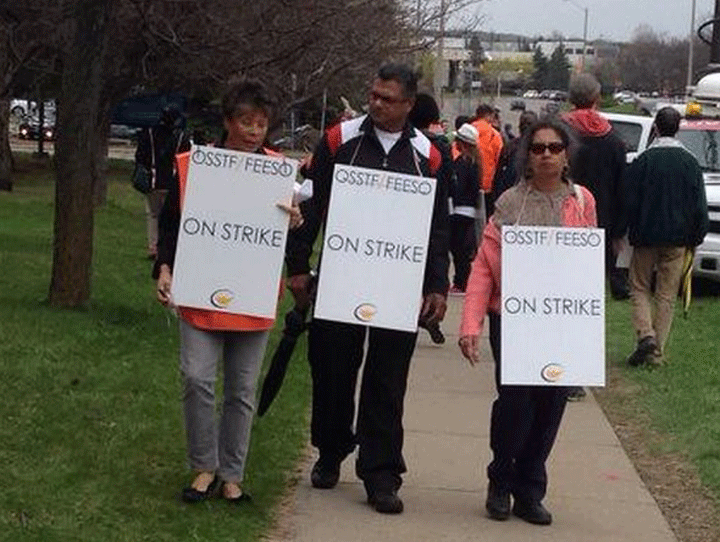TORONTO – Most Ontario teachers’ unions are back at the bargaining table with school boards, but they haven’t even started talking about the government’s demand for “net zero” wage increases.

After a lull of several months, negotiations for unions representing 115,000 teachers have either resumed or are scheduled, but they’re still dealing with non-monetary issues, said Ann Hawkins of the Ontario English Catholic Teachers’ Association.
Hawkins won’t say if OECTA is prepared to accept a deal without a pay hike, but points out teachers already had their wages frozen for the previous two years.
“I don’t know which other segment of society is going to look at a five-year wage freeze,” Hawkins said in an interview. “We’re still struggling with the other issues, which are non-monetary items, and we’re hoping if we can get those solved then we can look at where we go on wages and benefits.”
Premier Kathleen Wynne says the government will not fund any salary increases for civil servants or anyone in the broader public sector – more than one million Ontario workers – until it eliminates an $11.9-billion deficit, which it plans to do by 2017-18.
“I know that there is consternation among the teachers’ ranks,” Wynne said Wednesday. “I’ve said all along this is a difficult negotiation. We’re in a difficult fiscal situation.”
However, unions representing nurses, police, firefighters, municipal employees and hospital workers in many Ontario communities have reached contracts this year with pay hikes or been awarded salary increases by arbitrators.
- Grocery code: How Ottawa has tried to get Loblaw, Walmart on board
- Alberta to overhaul municipal rules to include sweeping new powers, municipal political parties
- Military judges don’t have divided loyalties, Canada’s top court rules
- Norad looking to NATO to help detect threats over the Arctic, chief says
OECTA is concerned about attempts to remove a regulation that requires boards to hire teachers based on seniority and qualifications, which the government agreed to in 2012 to end complaints about nepotism, but only after contract talks with the Ontario Public School Boards’ Association broke down, said Hawkins.
“The trustees at some of the boards were never very happy about having to implement that,” said Hawkins. “It comes down to a matter of fairness.”
Hawkins said teachers spend too much time doing diagnostic assessments of students that aren’t always needed – not the standardized literacy and numeracy tests from the Education Quality Council, but a range of tests prepared by private companies.
“We’re really concerned with the amount of instructional time that is lost to this data collection,” said Hawkins. “Teachers are supposed to teach, not collect data.”
OECTA is scheduled to return to bargaining Thursday, the same day its members will begin job action at a high school in Moosonee, which starts classes several weeks earlier than most Ontario schools.
“That work to rule will in fact go ahead on Aug. 20 unless we can manage to pull a rabbit out of a hat here,” said Hawkins.
“Nobody wants to go to work to rule, it’s disruptive, but our main focus as teachers is to protect the classroom and the teaching environment.”
The unions are warning of co-ordinated job actions if there are no new agreements when classes resume, but none is threatening a full scale strike at this point.
The Ontario Secondary School Teachers’ Federation was in negotiations Tuesday and Wednesday, and declined to do any media interviews.
The Elementary Teachers’ Federation of Ontario doesn’t return to bargaining until Sept. 1. ETFO president Sam Hammond will outline details of its work-to-rule campaign Thursday, and was talking tough at the union’s annual meeting in Toronto this week.
“I say to the government and I say to (the boards), you are in for the fight of your lives,” said Hammond.



Comments